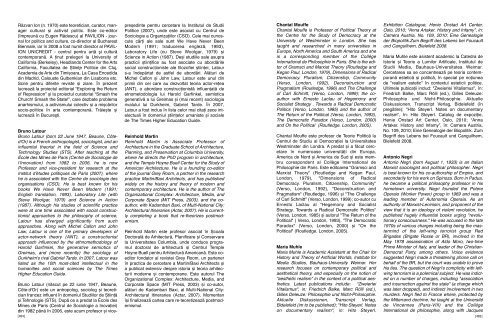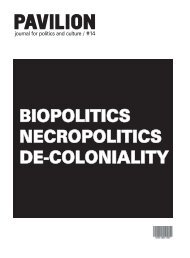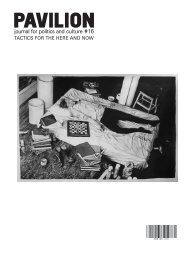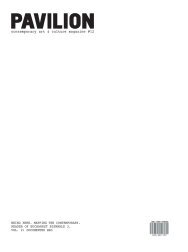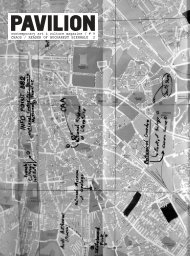PAVILION
PAVILION
PAVILION
- No tags were found...
You also want an ePaper? Increase the reach of your titles
YUMPU automatically turns print PDFs into web optimized ePapers that Google loves.
Răzvan Ion (n. 1970) este teoretician, curator, manager<br />
cultural și activist politic. Este co-editor<br />
(împreună cu Eugen Rădescu) al <strong>PAVILION</strong> - journal<br />
for politics and culture, co-director al Bucharest<br />
Biennale, iar în 2008 a fost numit director al PAVIL-<br />
ION UNICREDIT - centrul pentru artă şi cultură<br />
contemporană. A ținut prelegeri la University of<br />
California (Berkeley), Headlands Center for the Arts<br />
California, Facultatea de Știinţe Politice din Cluj,<br />
Academia de Arte din Timișoara, La Casa Encedida<br />
din Madrid, Calouste Gulbenkian din Lisabona etc.<br />
Scrie pentru diferite reviste și ziare. În prezent<br />
lucrează la proiectul editorial “Exploring the Return<br />
of Repression” și la proiectul curatorial “Smash the<br />
Church! Smash the State!”, care dezbate problema<br />
anarhismului, a activismului colectiv și a mișcărilor<br />
socio-politice în arta contemporană. Trăiește și<br />
lucrează în Bucureşti.<br />
Bruno Latour<br />
Bruno Latour (born 22 June 1947, Beaune, Côted'Or)<br />
is a French anthropologist, sociologist, and an<br />
influential theorist in the field of Science and<br />
Technology Studies (STS). After teaching at the<br />
École des Mines de Paris (Centre de Sociologie de<br />
l'Innovation) from 1982 to 2006, he is now<br />
Professor and vice-president for research at the<br />
Institut d'études politiques de Paris (2007), where<br />
he is associated with the Centre de sociologie des<br />
organisations (CSO). He is best known for his<br />
books We Have Never Been Modern (1991;<br />
English translation, 1993), Laboratory Life (with<br />
Steve Woolgar, 1979) and Science in Action<br />
(1987). Although his studies of scientific practice<br />
were at one time associated with social constructionist<br />
approaches to the philosophy of science,<br />
Latour has diverged significantly from such<br />
approaches. Along with Michel Callon and John<br />
Law, Latour is one of the primary developers of<br />
actor-network theory (ANT), a constructionist<br />
approach influenced by the ethnomethodology of<br />
Harold Garfinkel, the generative semiotics of<br />
Greimas, and (more recently) the sociology of<br />
Durkheim's rival Gabriel Tarde. In 2007, Latour was<br />
listed as the 10th most-cited intellectual in the<br />
humanities and social sciences by The Times<br />
Higher Education Guide.<br />
[484]<br />
Bruno Latour (născut pe 22 iunie 1947, Beaune,<br />
Côte-d'Or) este un antropolog, sociolog și teoretician<br />
francez influent în domeniul Studiilor de Știință<br />
și Tehnologie (STS). După ce a predat la École des<br />
Mines de Paris (Centrul de Sociologie a Inovației)<br />
din 1982 până în 2006, este acum profesor și vicepreședinte<br />
pentru cercetare la Institutul de Studii<br />
Politice (2007), unde este asociat cu Centrul de<br />
Sociologie a Organizațiilor (CSO). Cele mai cunoscute<br />
cărți ale sale sunt We Have Never Been<br />
Modern (1991; traducerea engleză, 1993),<br />
Laboratory Life (cu Steve Woolgar, 1979) și<br />
Science in Action (1987). Deși studiile sale asupra<br />
practicii științifice au fost asociate cu abordările<br />
social construcționiste ale filozofiei științei, Latour<br />
s-a îndepărtat de astfel de abordări. Alături de<br />
Michel Callon și John Law, Latour este unul din<br />
primii din cei care au dezvoltat teoria actor-rețea<br />
(ANT), o abordare construcționistă influențată de<br />
etnometodologia lui Harold Garfinkel, semiotica<br />
generativă a lui Greimas și (mai recent) sociologia<br />
rivalului lui Durkheim, Gabriel Tarde. În 2007,<br />
Latour a fost inclus în lista celor mai citați zece intelectuali<br />
în domeniul științelor umaniste și sociale<br />
de The Times Higher Education Guide.<br />
Reinhold Martin<br />
Reinhold Martin is Associate Professor of<br />
Architecture in the Graduate School of Architecture,<br />
Planning, and Preservation at Columbia University,<br />
where he directs the PhD program in architecture,<br />
and the Temple Hoyne Buell Center for the Study of<br />
American Architecture. He is a founding co-editor<br />
of the journal Grey Room, a partner in the research<br />
practice Martin/Baxi Architects, and has published<br />
widely on the history and theory of modern and<br />
contemporary architecture. He is the author of The<br />
Organizational Complex: Architecture, Media, and<br />
Corporate Space (MIT Press, 2003), and the coauthor,<br />
with Kadambari Baxi, of Multi-National City:<br />
Architectural Itineraries (Actar, 2007). He is currently<br />
completing a book that re-theorizes postmodernism.<br />
Reinhold Martin este profesor asociat în Școala<br />
Doctorală de Arhitectură, Planificare și Conservare<br />
la Universitatea Columbia, unde conduce programul<br />
doctoral de arhitectură și Centrul Temple<br />
Hoyne Buell pentru Arhitectură Americană. Este coeditor<br />
fondator al revistei Grey Room, un partener<br />
în practica de cercetare a Martin/Baxi Architects și<br />
a publicat extensiv despre istoria și teoria arhitecturii<br />
moderne și contemporane. Este autorul The<br />
Organizational Complex: Architecture, Media, and<br />
Corporate Space (MIT Press, 2003) și co-autor,<br />
alături de Kadambari Baxi, al Multi-National City:<br />
Architectural Itineraries (Actar, 2007). Momentan<br />
își finalizează cartea care re-teoretizează postmodernismul.<br />
Chantal Mouffe<br />
Chantal Mouffe is Professor of Political Theory at<br />
the Centre for the Study of Democracy at the<br />
University of Westminster in London. She has<br />
taught and researched in many universities in<br />
Europe, North America and South America and she<br />
is a corresponding member of the Collège<br />
International de Philosophie in Paris. She is the editor<br />
of Gramsci and Marxist Theory (Routledge and<br />
Kegan Paul, London, 1979), Dimensions of Radical<br />
Democracy. Pluralism, Citizenship, Community<br />
(Verso, London, 1992), Deconstruction and<br />
Pragmatism (Routledge, 1996) and The Challenge<br />
of Carl Schmitt, (Verso, London, 1999); the coauthor<br />
with Ernesto Laclau of Hegemony and<br />
Socialist Strategy . Towards a Radical Democratic<br />
Politics (Verso, London, 1985) and the author of<br />
The Return of the Political (Verso, London, 1993),<br />
The Democratic Paradox (Verso, London, 2000)<br />
and On the Political (Routledge. London, 2005).<br />
Chantal Mouffe este profesor de Teorie Politică la<br />
Centrul de Studiu al Democrației la Universitatea<br />
Westminster din Londra. A predat și a făcut cercetare<br />
în numeroase universități din Europa,<br />
America de Nord și America de Sud și este membru<br />
corespondent al Collège International de<br />
Philosophie din Paris. Este editoarea "Gramsci and<br />
Marxist Theory" (Routledge and Kegan Paul,<br />
London, 1979), "Dimensions of Radical<br />
Democracy. Pluralism, Citizenship, Community"<br />
(Verso, London, 1992), "Deconstruction and<br />
Pragmatism" (Routledge, 1996) și "The Challenge<br />
of Carl Schmitt" (Verso, London, 1999); co-autor cu<br />
Ernesto Laclau al "Hegemony and Socialist<br />
Strategy. Towards a Radical Democratic Politics"<br />
(Verso, London, 1985) și autorul "The Return of the<br />
Political" ( Verso, London, 1993), "The Democratic<br />
Paradox" (Verso, London, 2000) și "On the<br />
Political" (Routledge. London, 2005).<br />
Maria Muhle<br />
Maria Muhle is Academic Assistant at the Chair for<br />
History and Theory of Artificial Worlds, Institute for<br />
Media Studies, Bauhaus-University Weimar. Her<br />
research focuses on contemporary political and<br />
aesthetical theory, and especially on the notion of<br />
“aesthetic realism” in the context of a political aesthetics.<br />
Latest publications include: "Zweierlei<br />
Vitalismus", in: Friedrich Balke, Marc Rölli (ed.),<br />
Gilles Deleuze: Philosophie und Nicht-Philosophie.<br />
Aktuelle Diskussionen, Transcript Verlag,<br />
Bidelefeld (im to be published); "Hito Steyerl. Notes<br />
on documentary realism", in: Hito Steyerl.<br />
Exhibition Catalogue, Henie Onstad Art Center,<br />
Oslo, 2010; “Anna Artaker. History and Infamy”, in:<br />
Camera Austria, No. 109, 2010; Eine Genealogie<br />
der Biopolitik.Zum Begriff des Lebens bei Foucault<br />
und Canguilhem, Bielefeld 2008.<br />
Maria Muhle este asistent academic la Catedra de<br />
Istorie și Teorie a Lumilor Artificale, Institutul de<br />
Studii Media, Bauhaus-Universitatea Weimar.<br />
Cercetarea sa se concentrează pe teoria contemporană<br />
estetică și politică, în special pe noțiunea<br />
de "realism estetic" în contextul esteticii politice.<br />
Ultimele pubicații includ: "Zweierlei Vitalismus", în:<br />
Friedrich Balke, Marc Rölli (ed.), Gilles Deleuze:<br />
Philosophie und Nicht-Philosophie. Aktuelle<br />
Diskussionen, Transcript Verlag, Bidelefeld (în<br />
pregătire); "Hito Steyerl. Notes on documentary<br />
realism", în: Hito Steyerl. Catalog de expoziție,<br />
Henie Onstad Art Center, Oslo, 2010; “Anna<br />
Artaker. History and Infamy”, în: Camera Austria,<br />
No. 109, 2010; Eine Genealogie der Biopolitik. Zum<br />
Begriff des Lebens bei Foucault und Canguilhem,<br />
Bielefeld 2008.<br />
Antonio Negri<br />
Antonio Negri (born August 1, 1933) is an Italian<br />
Marxist sociologist and political philosopher. Negri<br />
is best-known for his co-authorship of Empire, and<br />
secondarily for his work on Spinoza. Born in Padua,<br />
he became a political philosophy professor in his<br />
hometown university. Negri founded the Potere<br />
Operaio (Worker Power) group in 1969 and was a<br />
leading member of Autonomia Operaia. As an<br />
authority of Marxist-Leninism, and proponent of the<br />
view that it is an ideology of violent revolution, he<br />
published hugely influential books urging "revolutionary<br />
consciousness." He was accused in the late<br />
1970s of various charges including being the mastermind<br />
of the left-wing terrorist group Red<br />
Brigades (Brigate Rosse or BR), involved in the<br />
May 1978 assassination of Aldo Moro, two-time<br />
Prime Minister of Italy, and leader of the Christian-<br />
Democrat Party, among others. Voice evidence<br />
suggested Negri made a threatening phone call on<br />
behalf of the BR, but the court was unable to prove<br />
his ties. The question of Negri's complicity with leftwing<br />
terrorism is a polemical subject. He was indicted<br />
on a number of charges, including "association<br />
and insurrection against the state" (a charge which<br />
was later dropped), and indirect involvement in two<br />
murders. Negri fled to France where, protected by<br />
the Mitterrand doctrine, he taught at the Université<br />
de Vincennes (Paris-VIII) and the Collège<br />
International de philosophie, along with Jacques<br />
[485]


